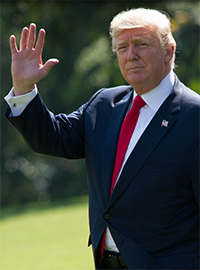| Trump's Lead and GOP Decision-Making |
 |
|
By Byron York
Wednesday, October 25 2023 |
Former President Donald Trump's support now stands at 59% among Republican voters nationwide in the 2024 presidential nomination race. His lead over Florida Gov. Ron DeSantis, still the second-place candidate in the race, is 46.3 points. Both Trump's support and the size of his lead are the biggest they have ever been. After four indictments from federal and local prosecutors, plus an ongoing and widely reported trial in a lawsuit by the New York attorney general – after all of that, Trump's lead is still inching higher. And that is affecting the thinking and decision-making going on in campaign offices all around the country, as well as on Capitol Hill. The Republican majority in the House, of course, is still trying to elect a speaker. You don't have to be reminded that it is not going well. There were at least nine candidates for the job when Republicans began casting votes again Tuesday. Many critics pointed out that seven of the nine voted to decertify the results of the 2020 election from Arizona and Pennsylvania on Jan. 6, 2021. That's not likely to have a big effect on the speaker contest; on that day, 58% of House Republicans voted against certifying the Arizona results, and 66% voted against certifying the Pennsylvania tally. What will have more influence on GOP thinking is what Trump says about the contest. For example, when Republicans returned to Washington on Monday, the candidate seen as leading the speaker's race was House Whip Tom Emmer. But there were many news reports that Trump had privately told allies he did not support Emmer. Then, when Emmer won a vote among House Republicans to advance in the speaker contest, Trump went public, calling Emmer a "RINO" and saying voting for him would be a "tragic mistake." That was it for Emmer. His speaker bid collapsed within an hour of Trump's statement. Why did it happen, and happen so quickly? In part, it was Trump's popularity. If Trump were in fifth place in the Republican presidential race, if he were not dominating every poll, he would have almost no say in the speaker's race. But Trump is just under 60% in the race, according to the RealClearPolitics average of national polls. And those national polls are made up of voters in specific states and congressional districts. Republican lawmakers know that. Then there is the presidential race. Trump's opponents inside the GOP desperately want some of the candidates to quit to allow non-Trump Republicans to unite behind a single challenger to Trump. They used to want that challenger to be DeSantis. Now, many want the challenger to be Nikki Haley, who now stands 51.2 points behind Trump in the national polls. Yes, the early state polls are closer. Haley is 40.8 points behind Trump in Iowa, 30.8 points behind Trump in New Hampshire, and 32.5 points behind Trump in her home state of South Carolina. But still, those are big numbers. Trump's unprecedented lead is having two effects on GOP thinking. The first effect is: It's over. There's no way anybody can beat him. The second effect is: It's still early. There's no way this can last. If you are a candidate, the temptation is to dismiss the first and embrace the second. That's why we're not seeing the candidate withdrawals that some anti-Republicans have sought. If you're in the race, and you're not Trump, the second way of thinking is so much more appealing: This can't last, and what I need to do is stay in the game long enough for things to change. Then, maybe, I'll have a chance. And that's what those candidates are doing. So far, no Republican candidate who would reasonably be described as major has quit the race. The only withdrawals we have seen have been Xavier Suarez, Will Hurd and Perry Johnson. Put them all together and you couldn't get to 1% support nationally. Meanwhile, Doug Burgum is still in the race. Asa Hutchinson is still in. Tim Scott. Chris Christie. Mike Pence. A bunch of candidates who are more than 50 points behind the frontrunner are staying in the race. By this time in the 2016 Republican campaign – the last time there was a wide-open primary season – two major candidates, Rick Perry and Scott Walker, had already quit. On the day he dropped out, Perry was about 27 points behind front-running Donald Trump, who stood at 29.8%. When Walker quit, he was about 25 points behind Trump, who was then at 28.5%. Now, every candidate besides DeSantis is more than 50 points behind Trump – and DeSantis isn't doing much better. But they stay in because of one belief, or hope: There's no way this can last. One thing that shows is that Trump's ratings are influencing, if not outright controlling, many big decisions that are being made in the Republican Party today, whether by lawmakers in Washington or candidates out in the states. And the most important thing to remember is that Trump's poll ratings are not abstract things. They represent real Republican voters. In the end, it is Republican voters who are driving things. They are in control, and so far, they are still with Trump. Byron York is chief political correspondent for The Washington Examiner. COPYRIGHT 2023 BYRON YORK |
Related Articles : |
























